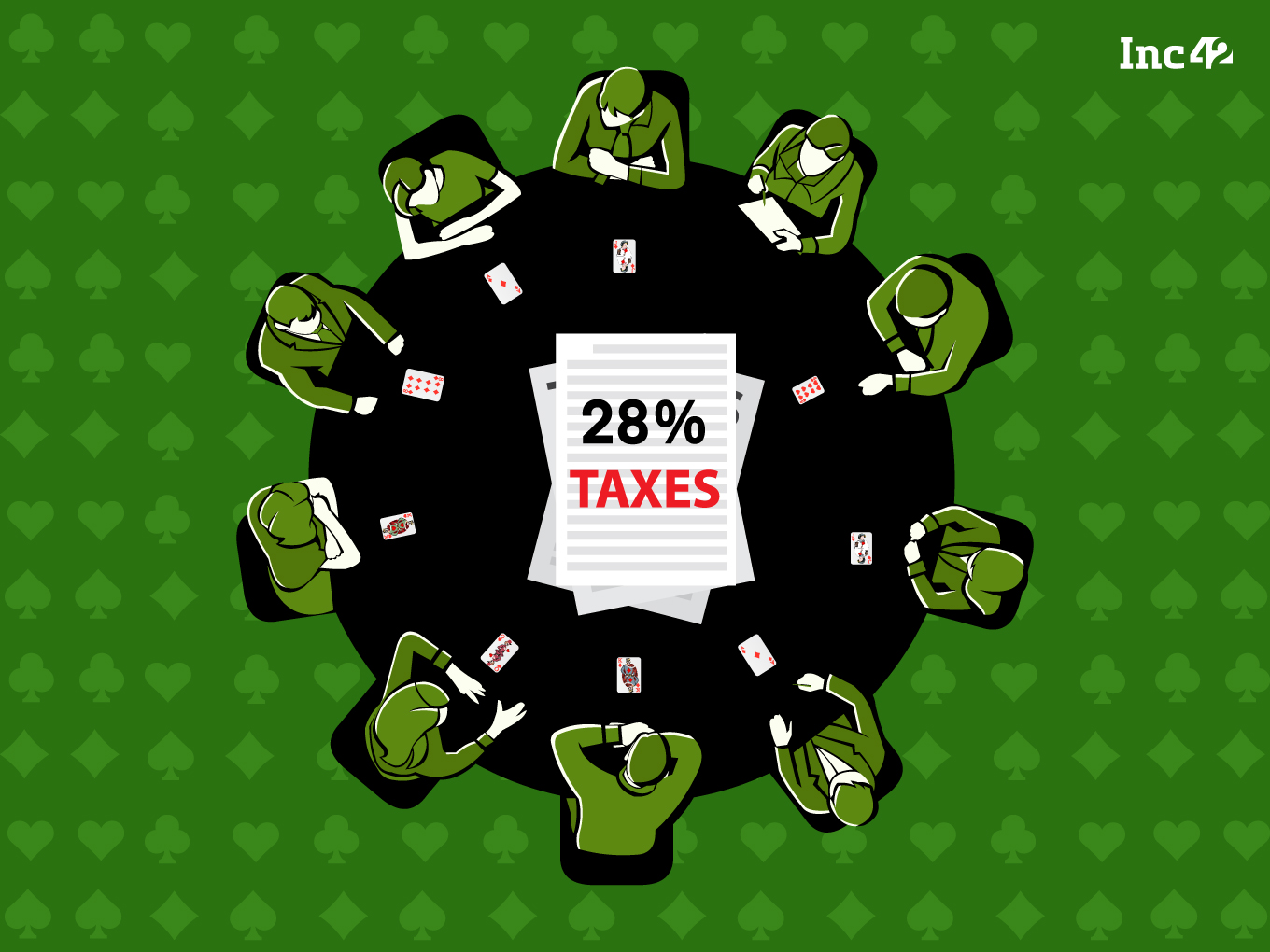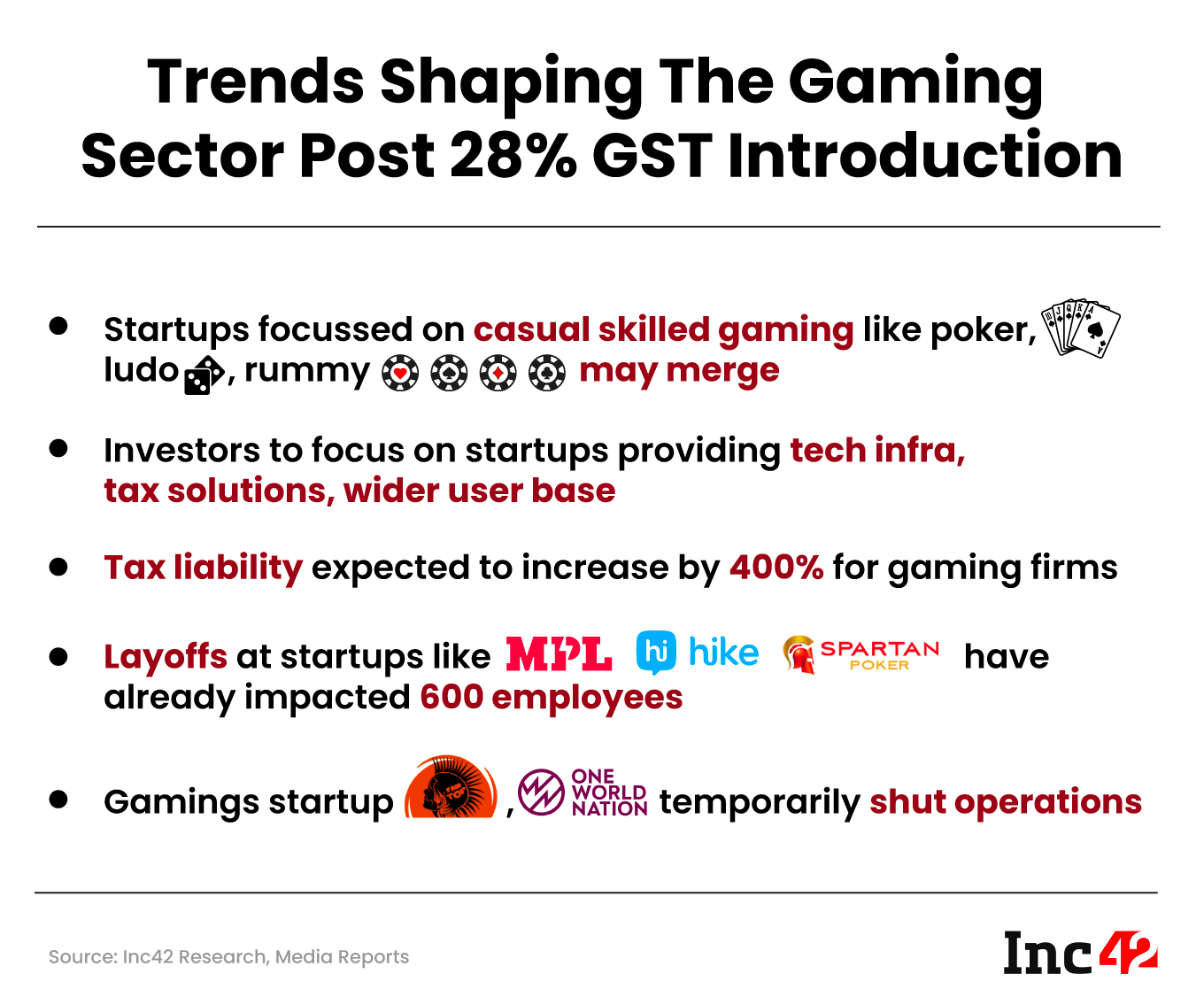On The Brink: Small Indian Gaming Startups Mull Sale Amid 28% GST Chaos

At a time when the Indian online gaming sector is crying havoc due to the new 28% GST regime, which does not differentiate between games of skill and games of chance, top industry sources have revealed that the Centre’s decision has triggered a consolidation wave in the industry.
After the introduction of the GST, several gaming startups, including unicorns and soonicorns, wrote to the central government seeking some modifications in the 28% GST regime for the greater good of the industry.
In the aftermath, Inc42 has learnt that more than 20-25% of these companies are now in the market for sale or are looking for acquihire opportunities. According to sources, a gaming giant alone may have spoken to at least 100 Indian small online gaming firms in August for acquisitions.
A top investor, who did not wish to be named, said that a Series A gaming startup, which has acquired lakhs of customers, is profitable and offers various real money gaming options, is looking to get acquired at a valuation loss of 50-60%.
“We are talking to at least 2 to 3 companies daily that are up for sale. It is a distressed market and hence the buyouts are the only option. We can say that the Indian gaming industry will see a lot of consolidations happening in the next few quarters,” the investor said.
Another industry veteran said that it is a very opportune time for companies that have enough capital to acquihire, acquire and merge with smaller peers. This will not only help them to expand their capabilities but also save many from getting perished.
“Companies are selling for pennies as against dollars,” the analyst said.
It is pertinent to note that many gaming startups have been severely impacted by the Centre’s decision to levy a 28% GST on the sector. As a result, while some startups have been forced to shut their shops, others have resorted to slashing headcount to cut costs.
Gaming unicorn, MPL was one of the first industry players to announce layoffs after 28% GST rule. The company fired 350 employees. This was followed by the online poker platform, Spartan Poker.
Who Is Looking For A Potential Sell-Off?
According to the sectoral experts we spoke with, real money gaming platforms, which promote games like rummy, poker, ludo, etc., may look at selling off their assets due to the prevailing market conditions.
The CEO of gaming firm 1Verse, Prashanth Joshua, said that the skilled gaming platforms on which players play individually will be severely impacted compared to fantasy gaming platforms that engage players in groups.
“Every RMG company is supposed to pay 28% of their deposit money as GST, however, the companies that focus on individual gamers and are in the annual revenue range of INR 1 Cr to INR 100 Cr will find it unsustainable to run operations in this environment and would be looking to merge,” he added.
Joshua added that gaming companies with conventional focus like card games and the ones that are popular among various Indian communities, may not be up for sale.
“As against the notion that online gaming is a new concept in India, the reality is that various games are very much a part of our country’s culture and are played on festivals and involve real money. Eventually, the same games are played in online groups or social media platforms. Now, the platforms that built the technology for these gamers have a strong userbase and would not necessarily merge with others,” Joshua said.
However, as per him, companies with a huge user base may merge with the ones that have a strong tech interface.
“The product, consumer experience and user retention are some of the metrics that the investors or large firms will be keen to look at when it comes to acquisitions of smaller RMG companies. The companies that are strong in any of these propositions would be a good buyout opportunity,” he explained.
Echoing the sentiment, Pearl Agarwal, the managing director of a gaming-focussed fund, Eximius Ventures, said that real money gaming companies, which offer both — the games of chance like betting, lottery, and opinion trading and skill-based casual gaming platforms such as rummy, poker, ludo, and chess — will be looking to get acquired.
She pointed out that larger gaming firms would look to re-strategise their revenue, and valuation expectations and accept the new normal, which directs them to pay a 28% GST on overall deposits.
“The important aspect to look out for both small and big companies would be user retention. That is because the new GST rule applies to the deposits made by any user with the gaming platform. However, if the same user again deposits his winnings or more money with the platform, the GST may not be even applicable on the recurring deposits. Hence, retaining users will be key to avoiding the tax burden,” Agarwal explains.

Meanwhile, E Paul Micheal, the former CEO of India Plays and a gaming consultant, anticipates that the real money gaming industry would see the entry of fewer players due to the new tax regime. However, the sector is all set to witness a wave of consolidations in the next few quarters, paving the way for innovation, promotional offers, and more liquidity for users.
“This is true for any industry going through distress. Some shutdowns and a lot of M&As to sustain the changed regulatory environment and work around a process that is in line with the rules. However, to say that the industry will shut down or major players will move their bases out of the country would be an exaggeration. The truth is that the online gaming sector is a highly regulated sector globally. There are tax provisions for the industry even outside India,” he added.
Funding Focus On Non-RMG Platforms?
Even as the real money games contribute more than 70% of the revenues to the online gaming industry, there are VC funds like Kalaari Capital, Matrix Partners, Lumikai, Exumius, KRAFTON’s VC arm that are now looking to invest actively in non-RMG gaming companies.
For non-RMG gaming firms, monetisation avenues are mainly advertisements and platform fees. However, they will have to add value proposition to the users beyond entertainment to attract funding.
Some firms like Krafton and Lumikai have announced new funds to focus on online/mobile gaming in India, and it would be interesting to see how the capital is deployed across the gaming industry.
In June this year, Lumikai announced its fund II with a corpus of $50 Mn to be invested across 15-20 interactive media and gaming startups.
“Over the course of the last 3 years, we have seen 1,400+ deals and seen the industry attract investor interest, deepen founder quality and achieve liquidity events. We continue to remain bullish on the long-term potential of the India interactive market and this is our opportunity to build on the foundation we have laid,” Lumikai’s founding partner Salone Sehgal had then said.
Earlier in August, Battleground Mobile India (BGMI) maker KRAFTON announced to invest $150 Mn in India’s gaming and entertainment startups to nurture local talent, foster innovation and propel India to the forefront of the gaming industry.
In February, online gaming startup WinZO’s backer Courtside Ventures announced the launch of its third VC fund with an outlay of $100 Mn. Fund III will invest in across segments of startups including sports, online gaming and lifestyle. Besides WinZo, Courtside Ventures has backed gamified fintech startup Filo and NFT startup FanCraze.
A top marketing communications consultant who works with various gaming companies in India said that the global gaming venture funds are on an active lookout for India-based gaming startups because of the country’s massive gamer base of 450 Mn.
“We understand that the new regulations are in place, but instead of being bogged down in the rules, startups will have to find a way around and work with the government. At least now we can say that there is more clarity in place. We are actively seeing interest from global as well as domestic VCs when it comes to India’s gaming market,” she added.
According to experts, India will see a lot of interest from investors in segments like Generative AI, web3, NFTs, and gaming infrastructure.
With much at stake right now, it remains to be seen whether the gaming industry will survive the regulatory jolt and emerge stronger than ever on the back of quality consolidations or will continue to backslide and eventually die down.
[Edited by Shishir Parasher]
The post On The Brink: Small Indian Gaming Startups Mull Sale Amid 28% GST Chaos appeared first on Inc42 Media.
No comments